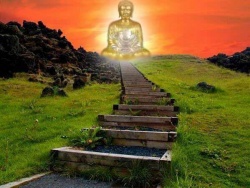Difference between revisions of "The Third Bardo"
(Created page with " In the third bardo the soul encounters the Lord of Death, a fearsome {{Wiki|demonic}} deity who appears in smoke and fire, and subjects the soul t...") |
|||
| Line 1: | Line 1: | ||
| − | + | [[File:BbYrGss.jpg|thumb|250px|]] | |
In the third [[bardo]] the [[soul]] encounters the [[Lord of Death]], a fearsome {{Wiki|demonic}} [[deity]] who appears in smoke and [[fire]], and [[subjects]] the [[soul]] to a [[Judgment]]. If the [[dead person]] protests that he has done no [[evil]], the [[Lord of Death]] holds up before him the [[Mirror]] of [[Karma]], "wherein every [[good and evil]] act is vividly reflected." Now {{Wiki|demons}} approach and begin to inflict torments and punishments upon the [[soul]] for his [[evil]] [[deeds]]. The instructions in the [[Bardo Thodol]] are for him to attempt to [[recognize]] the [[Voidness]] of all these [[beings]], including the [[Lord of Death]] himself; the [[dead person]] is told that this entire scene unfolding around him is a projection from his own [[mind]]. Even here he can attain [[liberation]] by [[recognizing]] this. | In the third [[bardo]] the [[soul]] encounters the [[Lord of Death]], a fearsome {{Wiki|demonic}} [[deity]] who appears in smoke and [[fire]], and [[subjects]] the [[soul]] to a [[Judgment]]. If the [[dead person]] protests that he has done no [[evil]], the [[Lord of Death]] holds up before him the [[Mirror]] of [[Karma]], "wherein every [[good and evil]] act is vividly reflected." Now {{Wiki|demons}} approach and begin to inflict torments and punishments upon the [[soul]] for his [[evil]] [[deeds]]. The instructions in the [[Bardo Thodol]] are for him to attempt to [[recognize]] the [[Voidness]] of all these [[beings]], including the [[Lord of Death]] himself; the [[dead person]] is told that this entire scene unfolding around him is a projection from his own [[mind]]. Even here he can attain [[liberation]] by [[recognizing]] this. | ||
Latest revision as of 03:29, 23 April 2014
In the third bardo the soul encounters the Lord of Death, a fearsome demonic deity who appears in smoke and fire, and subjects the soul to a Judgment. If the dead person protests that he has done no evil, the Lord of Death holds up before him the Mirror of Karma, "wherein every good and evil act is vividly reflected." Now demons approach and begin to inflict torments and punishments upon the soul for his evil deeds. The instructions in the Bardo Thodol are for him to attempt to recognize the Voidness of all these beings, including the Lord of Death himself; the dead person is told that this entire scene unfolding around him is a projection from his own mind. Even here he can attain liberation by recognizing this.
The soul who is still not liberated after the Judgment will now be drawn remorselessly toward rebirth.
The lights of the six Lokas will dawn again; into one of these worlds the soul must be born, and the light of the one he is destined for will shine more brightly than the others. The soul is still experiencing the frightening apparitions and sufferings of the third bardo, and he feels that he will do anything to escape from this condition. He will seek shelter in what appear to be caves or hiding-places, but which are actually the entrances to wombs. He is warned of this by the text of the Bardo Thodol, and urged not to enter them, but to meditate upon the Clear Light instead; for it is still possible for him to achieve the third degree of liberation and avoid rebirth.
Finally there comes a point where it is no longer possible to attain liberation, and after this the soul is given instructions on how to choose the best womb for a favorable incarnation. The basic method is non-attachment: to try to rise above both attraction to worldly pleasures and repulsion from worldly ills.
The final words of the Bardo Thodol are: "Let virtue and goodness be perfected in every way."
"Be not fond of the dull smoke-colored light from hell." - Tibetan Book of the Dead
